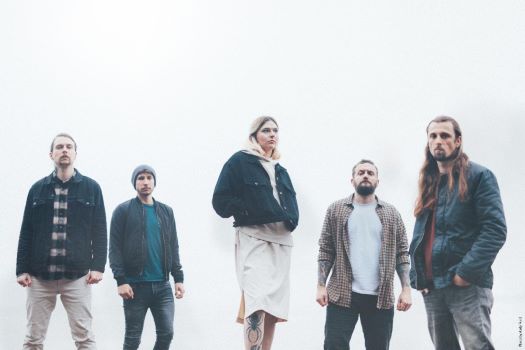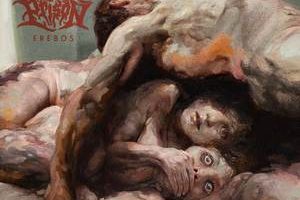Venom Prison – Music That Resonates
Tuesday, 25th January 2022
One of the more notable bands to come up in the more recent years with some absolutely devastating records is that of Venom Prison. They have merged a hardcore/punk ethos successfully with the bludgeoning sound of the extreme metal scene, and it’s made people take notice. So what happens when the band decides to really go all in and make a record that branches out a bit from their previous releases? That’s the question Erebos brings with it, and one that we discussed with guitarist Ash Gray. We also dig into the band’s lyrical messages, signing with Century Media, what defines the band, what he’d like in metal’s future, and more!
Dead Rhetoric: To you, what stands out about Erebos compared to your previous efforts?
Ash Gray: Quite a lot. I was speaking to the other band members and was saying that when I sit down and listen to this record, I can hear where we have had the time to really think about what was going to be on the record and how we were going to approach it. I think the biggest factor is time. When we had lockdown in the UK, we were supposed to be touring – it was going to be tour, tour, tour, write, record, and then go back out on tour. But we had a year to sit with the album and write it, whether at my place or at Ben’s [Thomas] place, and we would do all of the pre-productions. We had like 22 songs or something and we sat down and decided what was going to make the record. It was quite nice, even though nothing is wasted – we will find use for it somewhere down the line, but it was nice to sit with it and refine everything.
Then we started to bring some changes into the band. Album three is the big one, as they say, so we wanted to act like it was as well. Everyone started coming a bit more out of their shell and adding their own influences. It was something that we always thought we could do, but something that we had never added to Venom Prison. This is the record that where it all came full circle. We knew what everyone wanted to do, and what they were capable of doing. I think it was a way of getting it to be incorporated into the band. That’s what Erebos stands for as a Venom Prison record, more so than the other albums.
Dead Rhetoric: What would be something that you thought to include that you had previously overlooked, or never thought to include in the past?
Gray: I think we always knew about the clean singing, like we put into “Judges of the Underworld.” We always knew it could work, but we were always very hesitant. We were worried about what other people would think about it, but it got to the point where we were like, “We really just don’t care.” It sounded good to us, and we wanted to put out an album that represents us as a band. Other than the clean vocals, it was also Ben and I getting into all sorts of electronics – not so that it was really abrasive and standing out like a sore thumb, but learning how to bring depth and layer it into the songs. I think we did it on one song to see how well it worked. It’s going to have to be a reoccurring thing. So we pushed it through the entire record. When we recorded with Scott Atkins, he had just recorded Cradle of Filth as we came in. We were talking about how it adds more depth – another layer – and it makes it more interesting when you start to hear the finer details. I think that is what brings the songs to life a lot.
Dead Rhetoric: What do you feel has become more important to you, in terms of songwriting, as Venom Prison has been progressing?
Gray: I think a lot of the background that we come from – hardcore and punk, pretty much. It was all about energy and the live show. It still is. There’s so much energy in this new record, but to me, there was a lot to do with structuring. I was really thinking about structure more. I knew we could do certain things, like the chaotic stage dive circle pit stuff, but let’s focus on a record that just sits on a record player constantly. I know people still want to go to live shows, but it’s a record we could also listen to it at home. It’s not like, oh I listened to this record and now I want to see it live, it’s more I want to listen to this record over again. That was the approach that my brain thought about this time.
Dead Rhetoric: I think that aspect gets overlooked. There is that concept of, ‘let’s put this out and then get back on the road.’ But especially now, with no touring, it’s turned it around a bit. The album has to be something you want to listen to over again because there is nothing to go see.
Gray: Yeah, 100%. In my eyes, this is the first record that is more of a listener rather than ‘let’s rush out to a live show and go crazy.’ I feel it was more important, since we had moved on to Century Media and there are a lot of people who are fans of that label that are just purely music listeners. We knew that we would be on a roster of bands who have written well-constructed songs. A lot of these people haven’t seen half of those bands live, but they still listen to the albums day in and day out. That was what I wanted to be – that type of band. The band that people want to commute to work with and play on whatever platform they are using.
To take it away from it being a live environment – that was my biggest criticism of myself with the last record. I like the old records and proud of where they have brought us to. But it is a record that needs to be seen live to understand some aspects of it. Erebos could not be that. It needed to be a record that you want to listen to where ever you are, and that’s how we treated it.
Dead Rhetoric: You already mentioned a little of this with Century Media, but what was it that make CM the right label for the band after being with Prosthetic?
Gray: I think, for me, record labels are about them understanding you, and you understanding that they want to support that. The moment that clicked was when we were on a US tour and Mike Gitter came out to our LA show. He was speaking to us throughout the show. It was one of those situations where even in a few hours, I knew he understood our band. He understands what we are doing. We were talking about the new stuff and it was nice to have that conversation where we could see that he understood us and what we wanted to achieve as a band. To hand the record over is such a precious thing. It makes you feel more at ease when you know it is going into the hands of someone that already understands your band. That was definitely a deciding factor as to why we went with them. That connection and further conversations we had before signing, the ideas were already flowing around before we started anything. I knew that was the hands we needed to be in.
Dead Rhetoric: I feel like the hardcore/punk influences have helped Venom Prison stand out a bit in the extreme scene. Do you also feel like they have been a help?
Gray: Yeah, I do. I had to think about that. For me, it was the environment I grew up in. I was fortunate to be in that scene from a young age and people older than me helped me to discover music in that genre and subculture. I think it has always been a natural thing. I have been a big believer for our songs to have important messages and for the energy to be felt. I don’t think we could do anything else – even with some of the songs on Erebos leaning away a little bit, it’s still that energy and I hate to use the word, realness, but it really is. It’s the only way I can describe it. It’s not a record about slaying dragons or fighting goblins. These are real world issues. To have a song that aggressively backs that, like you are saying, the hardcore background helps. That’s the type of people we are, in and out of Venom Prison.
Dead Rhetoric: A number of the songs, lyrically as well as with videos, usually have some sort of social message. Do you feel that is an important piece you need to communicate as a band, as opposed to the fantasy stuff?
Gray: Definitely. I think it’s just who we are, to say it again. I don’t think it’s something made for Venom Prison, it was already there. It is weird, because when we started, we didn’t discuss anything along those lines. As soon as we recorded the demo, and started doing vocals, straight-away I could see where the lyrics were going. It wasn’t even a discussion, it just naturally fell in place. It’s really important for us. It’s so hard to have the emotion and passion for something if the message isn’t strong to you. I could never feel myself in a band talking about medieval times, or goblins/Vikings, it’s just not who I am as a person. It wouldn’t resonate with me. Venom Prison will always be what resonates with us.
Dead Rhetoric: So are there a few songs on the new album that stand out to you, lyrically?
Gray: I would say probably the whole album [laughs]. We followed a similar theme to what we have done with other records and following certain mythologies, because if we want to deliver a message we want it to be more artistic and not so much on the nose. It builds that creative element in having that approach. There’s a lot of that in Erebos. There are some deeper, personal issues on some of the songs. Some of them are a little different than what we usually do, and musically and lyrically, they are some of our most exposed songs. After talking about how we use different mythologies in artistic/creative ways, there are some songs that are very transparent and open and personal. I think it’s not even a song that you would need to go read the lyrics, you can just listen to it and understand it right away.
There were moments when the instruments were recorded in the studio and we got to the vocals on a specific song and even I was a bit, “Wow, that’s difficult to listen to right now.” To personally know the people as well, I can relate to what they are talking about. So there are some exposed songs in terms of personal issues. It will be interesting to see what people think, since it has the same classic Venom Prison way of writing lyrics, but some are very open and honest. I think people will be able to attach to them a lot quicker.
Dead Rhetoric: What do you feel defines what Venom Prison does, as a band?
Gray: That’s probably the hardest question to answer. Ever since day one, everyone has tried to label us with so many different things. For a long time, it made me laugh because people were like, “This is deathcore.” No one in Venom Prison even listens to deathcore. I could only name off the biggest bands of that genre, just because I know of them or we have toured together. So it confuses me when people say that. I’m like, “Is it? Is it really?” Or they will be like, this is hardcore. I don’t know about that. It definitely has elements but I wouldn’t go that far. So I think for me, it was always just meant to be a metal band. One with energy and sounds a bit different. Since we all come from similar backgrounds, we are all going to write in the same way, lyrically and musically, without even knowing it.
I think Ben comes from hardcore background too. When we met, Ben was also in a band with Mike [Jefferies] as well. I think it naturally fell into place that our songs will sound like that. It will be interesting for Erebos to come out, because we still use that, but I think we have decided to evolve it into something else. I said change direction not long ago, but it is in my eyes a direction change. I have gone for more catchy structures rather than how many notes I can play in 3 minutes. I think that has something to do with maturing as a band as well. The longer we go as a band, the more things become a lot clearer. We tour with bands, and when we gain influence sometimes it’s not even musically. I am very excited to see what people think about Erebos, because it’s not what you have heard on the other records. I was surprised with the response to the first single. It was a change and I didn’t know how it would go down. But it’s been better received than anything else we have done before!
Dead Rhetoric: It’s always good to lead with some change too. There seems to be a lot more people okay with that. If you do one or two more traditional songs and then throw a curveball, it can get messy.
Gray: I think we have approached it properly with the single choices, without giving too much away. It’s the next song, in my eyes, that is the big curveball [“Pain of Oizys”]. But the whole album is really. That is what I have been saying when people ask. It’s hard to pick a song that would be the traditional one. In my eyes, there isn’t one on there. It follows elements and playstyles of what we usually do, but in terms of influence, I would say it’s the most different record we have done by far.
Dead Rhetoric: What would you like to see in the music scene as it continues to grow and evolve?
Gray: I would like to see it progress further. I know that is broad, but I feel like a lot of things that are not in this genre are starting to take from this genre. Kind of like how you have all of these pop artists at the moment big into saying the word ‘moshpit.’ For me, it’s taking away but it’s not giving back. That’s what I thought was very funny with the Kardashians and Slayer. I feel like it is time for that alternative, rather than extreme, because it is time that it rises a lot more. A lot of these bands are getting way better and videos are getting way better. The content is getting way better and it’s time the bands deserve to grow and that people are interested in it. It’s such a hard one to get your head around as to why it hasn’t excelled as much as it should be. You will see a few bands who rise and grow, and they have been going for 20 odd years, but you a pop artist who drops one song and becomes global.
It’s all down to money. I say to everyone, like local bands asking how we did something. The harsh reality is that you have to have money. Venom Prison was started with 50 euros. Then we had to start playing shows to record an EP. I think about how many artists not in alternative music, get a load of money to get to that first step. They get all this money and become the biggest thing ever. I feel like there are more people working harder in the alternative scene and so many bands that should be recognized. There are so many bands that I say, “Why the hell are they not massive?”
Dead Rhetoric: What are your plans after the album releases?
Gray: We aren’t entirely sure. We are in that phase at the moment where we still are sorting through music videos and press to do. The general content building for the band before the album. We have had a few offers and festivals booked, but we have collectively said as a band that we will do the festivals with no issue but in terms of touring, I think we want to let the record release and back it with content – the singles and whatnot. We want to let it grow organically. Sometimes that’s a discussion.
I don’t know if day one release and day one touring is enough time for bands to circulate music. It seems to be the rule that they day you release, you go on tour. When I think about it, it’s insane. No one has had a chance to sit down and listen to your record. So this time around, we are going to focus on the album for a bit longer. That’s our plan right now. We have had tour offers, but right now, we are going to bide our time a bit and give the album the push it deserves from us. Then we will take a check on what we will do tour-wise.




























